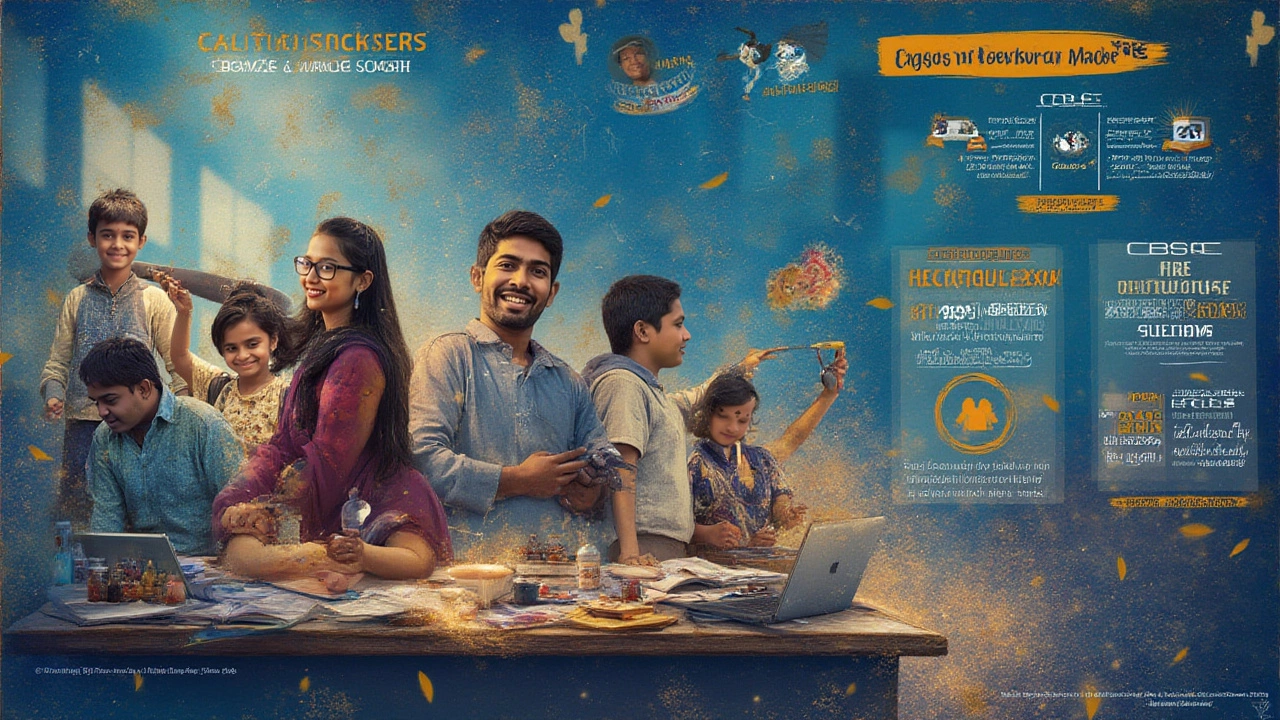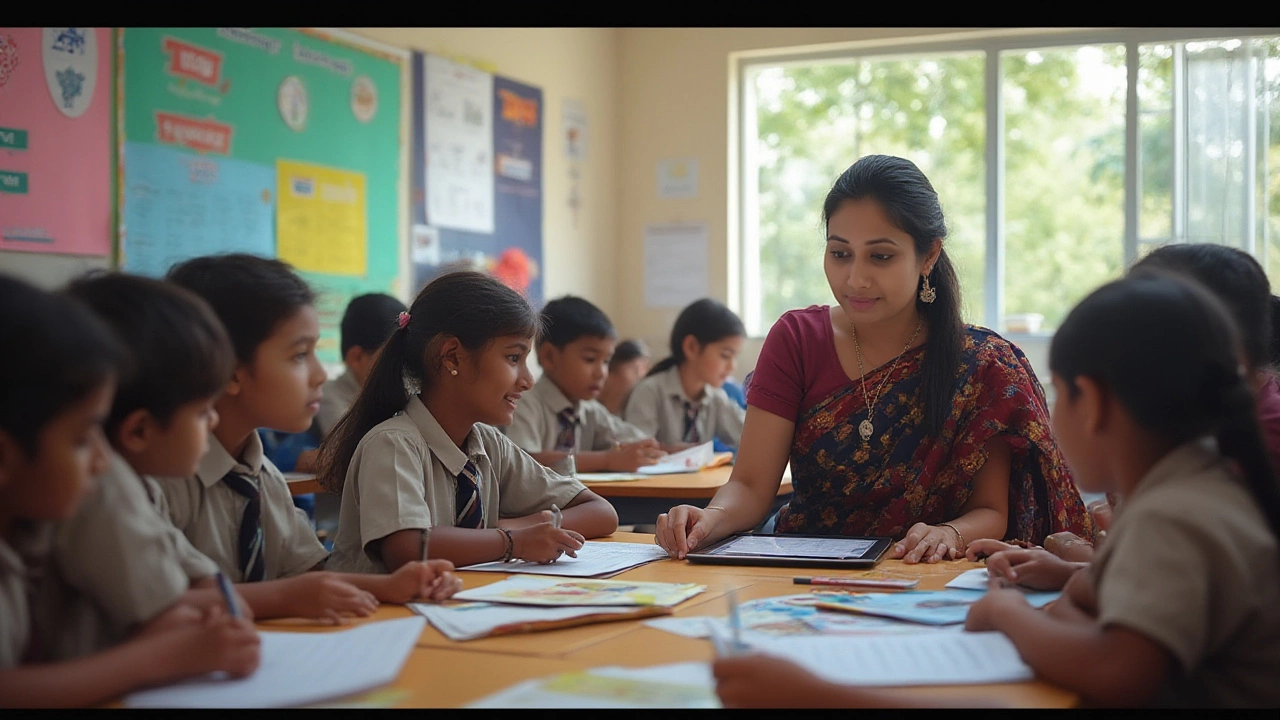Ask most parents in India about schools, and one thing comes up almost every time—CBSE. No matter if you’re in Chennai, Delhi, or a smaller city, the CBSE badge on a school seems to influence people more than a killer school ad or shiny new buildings. But why? Why does the CBSE tag carry so much weight in every education-related WhatsApp group, every parent meeting, every late-night advice call to that one 'education expert' uncle? Let’s dive into what makes CBSE tick and why it pulls students and parents like a magnet, year after year.
The CBSE Curriculum: Simpler, Smarter, Future-Ready
One of the biggest draws to CBSE is how the curriculum strikes that sweet spot between strict and supportive. Unlike some boards that feel like you need a PhD to decipher the textbooks, CBSE explanations put clarity out front. Chapters build up concepts a bit like stacking Lego blocks—first the basics, then more details, connecting ideas as you go. This layered approach makes it easy to catch up if you’ve missed a class or two.
CBSE doesn’t just stop at physics, chemistry, and math. There’s a huge focus on life skills, general awareness, and even creativity. You’ll spot lessons about daily life, technology, financial literacy, environmental issues, and social responsibilities right from an early age. That’s a subtle nudge for kids to think beyond textbooks or exam halls. Many teachers love the flexibility—plenty of room to add real-life examples or fun activities. In fact, many chapters these days include ideas for practical assignments and debates, not just end-of-chapter Q&As.
The CBSE is also known for keeping its syllabus up to date. During the COVID-19 lockdown, CBSE ditched several chapters and modified the academic calendar, making it a lot less stressful for students. The board is pretty quick to update science and social science topics, keeping everything in line with what’s going on in the world. So, when environmental issues blow up in the news, chances are CBSE kids will learn about it in school the very same year.
Here’s another fact: CBSE textbooks, mostly from the NCERT, are written by some of the country’s best-known educators. These are not folks recycling old notes—they’re experts who actually revisit and rewrite content every few years based on new guidelines. Ask any student prepping for competitive exams like NEET or JEE: NCERT books are the holy grail, and guess what, CBSE is built right around them.
Packed with clear, friendly examples and exercises that cover every possible exam style, CBSE content isn’t just about rote learning. From quick tests to open-ended essays, the board keeps things interesting. Just look at a recent Class 10 science paper and you’ll spot questions where students have to argue their case, not just fill in the blank. That’s miles ahead of boards that still trap students in a memorization race.
CBSE and Competitive Exams: A Natural Fit
If you fire up a search for top performers in engineering, medical, or government exams, CBSE alumni fill up a big chunk of the list. That’s not a coincidence. Every year, more than 15 lakh (1.5 million) students sit for JEE Main alone, and data from NTA in 2024 showed that over 65% of top-100 rankers were from CBSE backgrounds. At NEET—the medical entrance—the CBSE edge is just as strong, and that pattern repeats with exams like UPSC prelims and banking recruitment.
What gives CBSE kids their “exam-ready” edge? Nearly all major Indian competitive exams are designed with the CBSE syllabus at the core. This means question types, language, and reference concepts closely match what CBSE students see in their textbooks. That leads to less last-minute syllabus shock and a confidence boost during revision season. It's not only the content but the approach—the way CBSE builds conceptual understanding instead of just mugging up definitions—is a huge plus when tackling tricky problem-solving questions or logical reasoning sections in government and corporate entrance tests.
CBSE students get plenty of practice with different forms of assessments, both internal and external. Project work, presentations, formative tests, and regular class discussions all add up to better communication skills and analytical thinking—skills you need if you want to ace interviews and group discussions, not just written papers.
The board even sets up sample papers and mock tests on their website every year, straight from the source. This official stamp makes such materials super valuable for those gearing up for exams. Here’s something interesting: as per a 2023 study by the Indian Institute of Education Research, more than 70% of students who cracked both JEE Advanced and NEET were found to use CBSE resources, including NCERT and CBSE’s own question banks, for over 60% of their total prep time.
Here’s a quick peek at how CBSE stacks up against other boards when it comes to popular competitive exam results:
| Exam | CBSE Topper Percentage (2024) | Other Boards Topper Percentage (2024) |
|---|---|---|
| JEE Main (Top 100 Ranks) | 65% | 35% |
| NEET (Top 100 Ranks) | 62% | 38% |
Pretty clear, right? If competitive exams are in the plan, CBSE gives a leg up.

CBSE’s National Reach and Seamless Transfers
India is always on the move—families often shift cities for jobs, postings, or just in search of better school options. This is where CBSE shows its real muscle. With over 28,000 affiliated schools in India and 240+ schools in 28 countries abroad, finding a CBSE school for your child after a mid-year transfer is way easier than most other boards. If you compare it with state boards, you’ll see why—state curriculums mostly just operate in their own turf, and even switching states can throw a wrench into things due to different textbooks and exam patterns.
Imagine a Chennai family moving to Mumbai, Pune, or even outside India. With CBSE, the child’s syllabus, textbooks, and even ongoing projects don’t get derailed. Teachers from different CBSE schools are trained under the same education framework, so the style and quality stay pretty steady. That's not something you see with other boards—where kids often have to catch up with a completely new curriculum in the middle of the year, losing precious time and, sometimes, marks.
Another big plus: CBSE isn’t just for the metros or the “elite.” You’ll spot CBSE schools everywhere, from small towns in Tamil Nadu to hill stations in Himachal and big cities like Bangalore or Hyderabad. This makes it possible for parents working with the central government, banks, or companies like TCS (which love to transfer employees), to worry less about their kids’ education getting disrupted on their next move.
- More than 28,000 CBSE-affiliated schools across India (2025 data).
- Official CBSE presence in most Gulf countries, Singapore, and other parts of Asia.
- All Kendriya Vidyalayas and Jawahar Navodaya Vidyalayas use the CBSE syllabus.
That’s a reach no other board can really match, which explains why it is such a “default option” for government and defence families.
Student-Friendly Approach: Less Stress, More Choices
Modern education is stressful—there’s no denying it. Board exams, endless tuition, and the pressure to “perform” on every test can get to anyone. CBSE, compared with other boards, genuinely tries to reduce that load. Few people know that CBSE was one of the first boards to introduce a formal system for “continuous and comprehensive evaluation”—or CCE for short. Instead of your entire fate hanging on a single paper, CBSE spreads out assessments into little chunks throughout the year. This helps students figure out their strengths early and patch up weak spots without the risk of a complete wipeout at the end.
They were also quick to adapt the ‘no fail’ rule for classes 6 to 8, giving young students breathing room to learn without the fear of failing ruining their confidence. For senior students, CBSE now offers a far bigger list of electives than before: legal studies, applied maths, artificial intelligence, web application, and even yoga. This allows for some serious career exploration at the high school level itself. Kids who want to be engineers, lawyers, computer scientists or even athletes can mix and match subjects to fit their interests, which is rare outside the CBSE structure. While other boards are slowly catching up, CBSE remains the first to roll out pilot programs in coding, entrepreneurship and vocational skills.
And yes, on top of all this, CBSE makes exam answer sheets available for students on request—a move that has set benchmarks for transparency. Students can actually see how marks were awarded (or lost), and appeal if they spot errors. That’s real power in the hands of students, not just school administrators.
When the board exam results drop, CBSE tries to make things smooth and fast. For example, in May 2025, CBSE declared Class 10 and 12 results within 35 days of exams—a record compared to many state boards that often take double the time. Instant digital marksheets, easy online re-evaluation, and speedy migration certificates all make life less painful for students and families chasing college admissions.
Here are a few tips for students and parents thinking about CBSE:
- Pick a school that encourages both strong academics and real-life skills, not just exam scores.
- Make full use of the sample papers, mock tests, and answer sheets CBSE provides online.
- Explore electives smartly—CBSE offers rare subjects like data science, artificial intelligence, and design thinking at the high school level now.
- Form your own study groups—CBSE’s structure makes peer learning very effective.
- Don’t ignore the value-adds: CBSE’s focus on projects, NCC training, and physical activities helps build personality, not just grades.
Ask any student who’s grown up on the CBSE syllabus and you’ll hear one thing—the sense of being ready, not just for exams, but for the next big step, wherever life takes them. That’s probably why the CBSE crowd is everywhere, from top IITs and AIIMS to startups and multinational firms. If you’re after a blend of flexibility, national acceptance, and actual learning for today’s messy, unpredictable world, CBSE still edges out most other options. One thing’s for sure: when it comes to “future-proof” education in India, CBSE isn’t just a board—it’s almost a passport.
